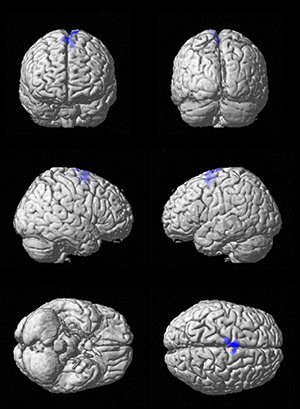The designation in blue shows where the brain was activated while listening to familiar music during a study of Alzheimer's patients. Photo by MATLAB Handle Graphics/University of Utah
April 30 (UPI) -- Music helps alleviate anxiety in patients with Alzheimer's disease, researchers say, because a region of the brain involved with remembering melody appears to have been spared from dementia -- and could be used to help treat and comfort people with the condition.
Researchers at the University of Utah Health determined that meaningful music helps calm those with Alzheimer's, and can lead to a new way to approach anxiety, depression and agitation in dementia patients -- as well as possibly slow their decline. Their research has been submitted for publication in The Journal of Prevention of Alzheimer's Disease.
"People with dementia are confronted by a world that is unfamiliar to them, which causes disorientation and anxiety," said contributing author Dr. Jeff Anderson, associate professor in Radiology at Utah Health said in a press release. "We believe music will tap into the salience network of the brain that is still relatively functioning."
Previous research has examined the effects of a personalized music program on mood for dementia patients. This time, the researchers wanted to know how to activate the attentional network in the salience region of the brain.
Researchers helped 17 participants select meaningful songs, and then played eight 20-second clips of each track forward and backward for them, in addition to playing silence.
"When you put headphones on dementia patients and play familiar music, they come alive," said Jace King, a graduate student in the Brain Network Lab. "Music is like an anchor, grounding the patient back in reality."
Researchers used an MRI to scan the brain during listening, finding that music activates the supplementary motor area of the brain. They also observed widespread increases in functional connectivity in cerebellar and corticocerebellar networks, as well as the visual network, salience network and executive network regions of the brain.
"This is objective evidence from brain imaging that shows personally meaningful music is an alternative route for communicating with patients who have Alzheimer's disease," said Dr. Norman Foster, director of the Center for Alzheimer's Care at Utah. "Language and visual memory pathways are damaged early as the disease progresses, but personalized music programs can activate the brain, especially for patients who are losing contact with their environment."
The researchers said it's unclear whether this works beyond a brief period or if other areas of memory or mood are enhanced for the long term. And though the sample size was small, they are optimistic.
"In our society, the diagnoses of dementia are snowballing and are taxing resources to the max," Anderson said. "No one says playing music will be a cure for Alzheimer's disease, but it might make the symptoms more manageable, decrease the cost of care and improve a patient's quality of life."















